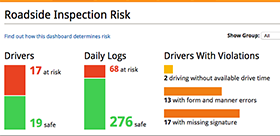There’s no denying that technology is changing business environments at a startling pace. If businesses are to remain competitive in the next decade, they must make investments in the digital transformation journey for the long-term. Fleet management, a sector that was once dominated by infrastructure and fleets, will witness radical changes in the upcoming years.
While disruptive technologies will change existing processes and systems, these changes bring a lot of benefits for all stakeholders in the company. Below we’ll go through 5 advantages that every fleet organization can gain by staying on top of fleet technology and trends.Read More »5 Benefits of Staying on Top of Fleet Technology




 Impacting every aspect of your operations, the biggest issue facing the transportation industry is regulatory compliance. Compliance requirements are in place to ensure the safety of the general public as well as ensuring vehicles are safe. The transportation industry is highly visible in the public eye and the measures are intended to protect people from poorly maintained vehicles and fatigued drivers.
Impacting every aspect of your operations, the biggest issue facing the transportation industry is regulatory compliance. Compliance requirements are in place to ensure the safety of the general public as well as ensuring vehicles are safe. The transportation industry is highly visible in the public eye and the measures are intended to protect people from poorly maintained vehicles and fatigued drivers.






